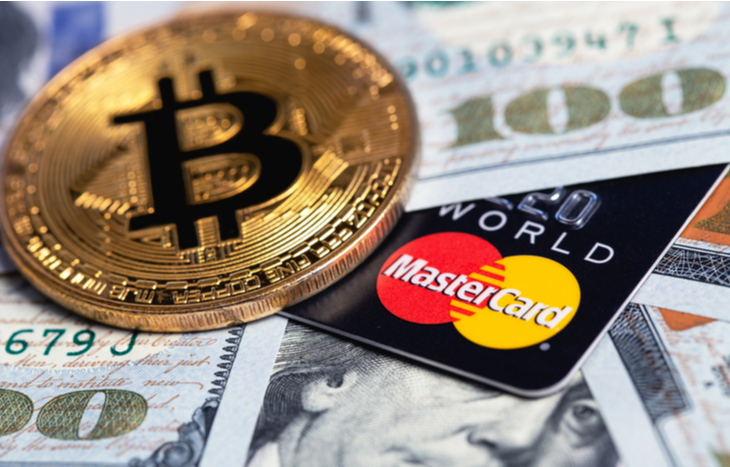The Key Takeaway From the Mastercard Crypto Announcement
Mastercard and crypto: They’re two words that don’t go together particularly well. But the great Mastercard crypto venture appears to be coming. And the very architecture most cryptos are built on could wind up being a hindrance.
In a widespread press release, the multinational financial services company teased that it would be bringing crypto onto its network. The announcement had crypto bagholders salivating. After all, this could signal a major step in transitioning cryptocurrency into an actual currency – and not just an investment.

To be fair, crypto as a form of payment isn’t unheard of. The oldest – and most famous – example is when Laszlo Hanyecz bought $30-worth of pizza with 10,000 Bitcoins back in 2010. No need to do the math to figure out who won that deal.
But fast-forward to today, and cryptocurrencies are mostly relegated to just exchanges between individuals. But we know that will eventually change. While some altcoins will disappear over time, Bitcoin and the other major crypto players aren’t going anywhere. So what we have here is essentially a race to see which financial institutions can get in on the action.
There are whispers that Apple (Nasdaq: AAPL) and cryptocurrencies could be joining forces in the future. It’s a possibility that makes a lot of sense, as Apple entered the financial service business in 2019. But the rules and regulations surrounding crypto could be exactly what keeps many cryptos out of retailers’ hands.
The Great Mastercard Crypto Question
When the Mastercard crypto announcement surfaced, it came with four important caveats. The company’s statement noted that it plans to start supporting select cryptocurrencies this year. No surprise there, as there are close to 8,000 cryptos out there. And a whole lot of them have failed… with more sure to follow in their footsteps.
But Mastercard offered some hints as to what it’s looking for in its crypto soulmate. For starters, it wants one that offers consumer protections – including privacy – as well as security for consumers’ information. That’s going to be a tough find. But the four-part list goes on. Mastercard further stipulated…
“Strict compliance protocols will be needed, including Know Your Customer, a requirement meant to snuff out illegal activity and deception in payment networks.”
That’s going to be a tough ask for most cryptocurrencies. And on top of that, Mastercard wants its crypto BFF to also “follow local laws and regulations in the regions they are used.” And its perfect crypto will also have to offer stability, meaning that it should be akin to something used for spending and NOT an investment.
That is one heckuva four-part ask. But those reservations do come with some merit. Cryptocurrencies are still a fringy idea – despite seeming to be everywhere. The Financial Crimes Enforcement Network doesn’t consider crypto to be legal tender. The IRS views crypto as property. And the SEC considers crypto to be a security – not unlike stocks.
While lots of big companies want a piece of the crypto action, it’s clear they’re going to need to be cautious. And that certainly appears to be the case with Mastercard. And let’s be honest, big institutions are exactly what crypto was designed to disrupt.
Regulating the Unregulatable
For now, the Mastercard crypto wish list is equal parts hooey and hogwash. The beauty of most cryptos is that they have a decentralized architecture with open networks. That puts them out of reach of governmental stabilization. And it also makes it nearly impossible to enforce the know-your-customer rules that Mastercard is looking for.
Of all the cryptocurrencies we’ve looked at, none of the big guys like Bitcoin, Ethereum or Polkadot qualifies. So Mastercard has already severely limited its user base. The only ones that could qualify would be certain “stablecoins” backed by a reserve asset – think Tether or U.S. Dollar Coin – which are backed by U.S. dollar deposits.
All of this kind of defeats the purpose of getting in on the crypto action. The user base will be extremely limited. And the traditional Mastercard user will most likely just stick to the fiat currency they’re used to.
More likely than not, this big press release wasn’t about a grand alliance between Mastercard and crypto. At most, it was a trial balloon to see how much of an appetite there is for such a thing. The short answer is a lot.
It’s why the crypto exchange Gemini is acquiring Blockrize with plans to launch a credit card this year. But Gemini is playing catch-up with Visa, which just launched a Bitcoin rewards credit card. Neither is a proper crypto-spending credit card, though. That nut has yet to be cracked. And from our vantage point, there’s only one way Mastercard gets the first crack.
Way Back to the Future
Remember way back when Facebook (Nasdaq: FB) started dipping its toe into the crypto pool? The original name was Libra. And things didn’t exactly go smoothly. It started with the Libra Association – a Geneva-based group Facebook created to develop the virtual currency.
The association recruited payment processors to be part of the project. But when regulators were faced with more and more unanswered questions about Libra, they bailed. Visa (NYSE: V), eBay (Nasdaq: EBAY), Stripe and Mastercard all jumped ship and left Libra to flounder.
But Libra is slowly coming back to life – just under a different name. Facebook’s stab at crypto is now called Diem. And it has a chance to make major waves in the world of crypto.
If just a tenth of Facebook’s massive 2.8 billion-person userbase jumps on the Diem train, it would dwarf the amount of Bitcoin users. No payment processing company is going to want to miss out on that. But they’ll want to mitigate legal risks in the process.
For the betting folks out there, the smart money is that this “big announcement” from Mastercard was more of a suggestion to those working on Diem. In other words, if Diem can meet Mastercard’s demands, they’re back. But until then, don’t expect cryptos on the Mastercard network too soon.
The Bottom Line on the Mastercard Crypto Announcement
Press releases are just part of the web these big businesses weave. In this case, it’s unlikely anything significant will form between Mastercard and cryptocurrencies. But it’s only a matter of time until a major payment company gets in the game. There’s just too much money being left on the table. Institutions are drooling to get in on the crypto action and get their slice of the $325 billion pie.
If you’d like to stay abreast of all the latest crypto news, sign up for our Manward Digest e-letter. It’s a surefire way to learn which cryptos are upward bound and which need to be dropped.
[adzerk-get-ad zone="245143" size="4"]About Matthew Makowski
Matthew Makowski is a senior research analyst and writer at Investment U. He has been studying and writing about the markets for 20 years. Equally comfortable identifying value stocks as he is discounts in the crypto markets, Matthew began mining Bitcoin in 2011 and has since honed his focus on the cryptocurrency markets as a whole. He is a graduate of Rutgers University and lives in Colorado with his dogs Dorito and Pretzel.





